Are you ready to embark on a journey of discovery about the delightful Chiweenie dog breed?
Picture this: a breed that combines the spunk and energy of a Chihuahua with the distinctive shape and charm of a Dachshund. Intrigued? Well, you're in for a treat!
In this discussion, we will unveil the fascinating characteristics and unique qualities that make Chiweenies such beloved companions. From their origin and history to their temperament and care needs, there is so much to uncover about these adorable little canines.
So, let's dive in and uncover the captivating world of Chiweenies together.
Key Takeaways
- Chiweenies are a small breed of dog that originated in the United States in the early 1990s.
- They are adaptable to apartment living and can thrive in smaller spaces, but energy levels and behavior towards neighbors should also be considered.
- When choosing a Chiweenie, consider your dog-owning experience and the sensitivity levels of the breed.
- Chiweenies have varying exercise requirements and playfulness levels, so it's important to match their needs with your own lifestyle.
Origin and History
The Chiweenie dog breed originated in the United States in the early 1990s, combining the characteristics of its parent breeds, the Chihuahua and the Dachshund. This hybrid breed was developed with the intention of creating a small-sized dog with a unique appearance and temperament.
The Chihuahua contributes its small size and lively personality, while the Dachshund brings its long body and hunting instincts. The Chiweenie's origin and history are relatively recent compared to other dog breeds, as it's a result of deliberate crossbreeding.
Since its creation, the Chiweenie has gained popularity as a companion dog due to its charming looks and friendly nature. This breed's combination of traits makes it an interesting and beloved addition to many households.
Size and Lifespan

With an average lifespan of 12-16 years, the Chiweenie is a small-sized dog breed that offers companionship for many years to come. This breed typically stands 10-12 inches tall and weighs between 10-20 pounds. The Chiweenie's size makes them suitable for apartment living, as they can adapt well to smaller spaces. Their compact size also makes them portable and easy to take on walks or trips. Despite their small stature, Chiweenies are known for their energetic and playful nature. They require regular exercise to keep them mentally and physically stimulated. Additionally, Chiweenies have varying coat types, including smooth, wiry, or longhaired, which may require different grooming needs. Overall, the Chiweenie is a small but lively breed that can bring joy and companionship to your life for many years.
| Size | Lifespan |
|---|---|
| Small | 12-16 years |
Coat Variations

Chiweenies exhibit a variety of coat variations, including smooth, wiry, or longhaired. These coat variations contribute to the unique appearance of each individual Chiweenie. The coat variations can also affect the grooming needs and allergenicity of the breed.
Here are three important points to know about Chiweenie coat variations:
- Smooth coat: Chiweenies with smooth coats have short and sleek fur that requires minimal grooming. This type of coat is generally low maintenance and easy to care for.
- Wiry coat: Chiweenies with wiry coats have a slightly rougher texture to their fur. This type of coat may require occasional hand-stripping or trimming to maintain its shape and prevent matting.
- Longhaired coat: Chiweenies with longhaired coats have soft and flowing fur that can be prone to tangling and shedding. Regular brushing and occasional trimming may be necessary to keep the coat healthy and free of mats.
Understanding the different coat variations of Chiweenies can help you choose the right grooming routine and care for your beloved furry friend.
Temperament and Personality
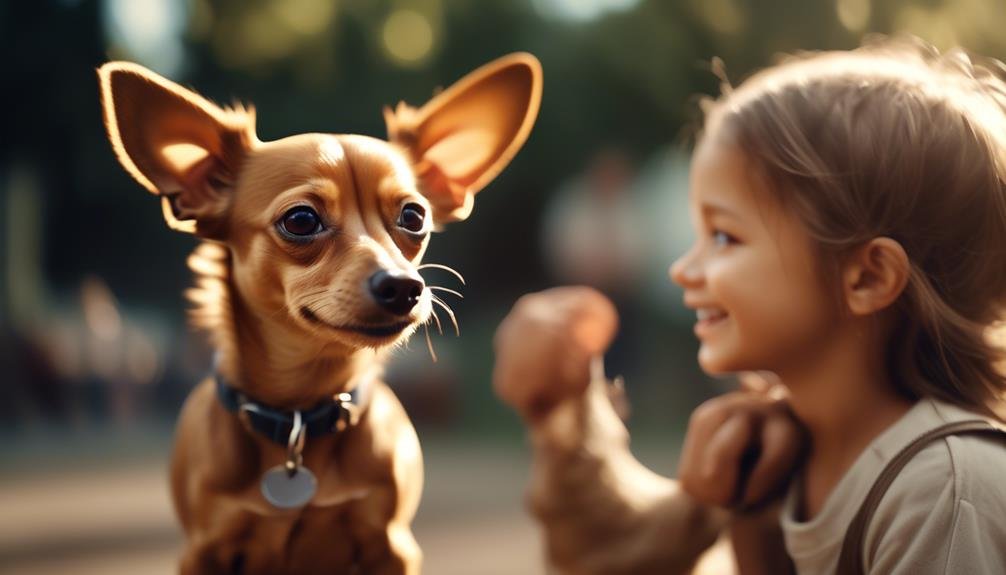
When considering the temperament and personality of Chiweenies, it's important to understand their unique characteristics and how they interact with their environment.
Chiweenies are known to be playful, affectionate, and loyal. They make good watchdogs due to their alert nature and ability to bark when strangers are present.
Chiweenies tend to form strong bonds with their owners and enjoy being part of the family. However, they can also be independent and may exhibit a stubborn streak at times.
It's important to provide consistent and positive training to ensure they understand their boundaries.
Chiweenies thrive in a loving and nurturing environment where they receive plenty of attention and exercise.
Apartment Living Considerations
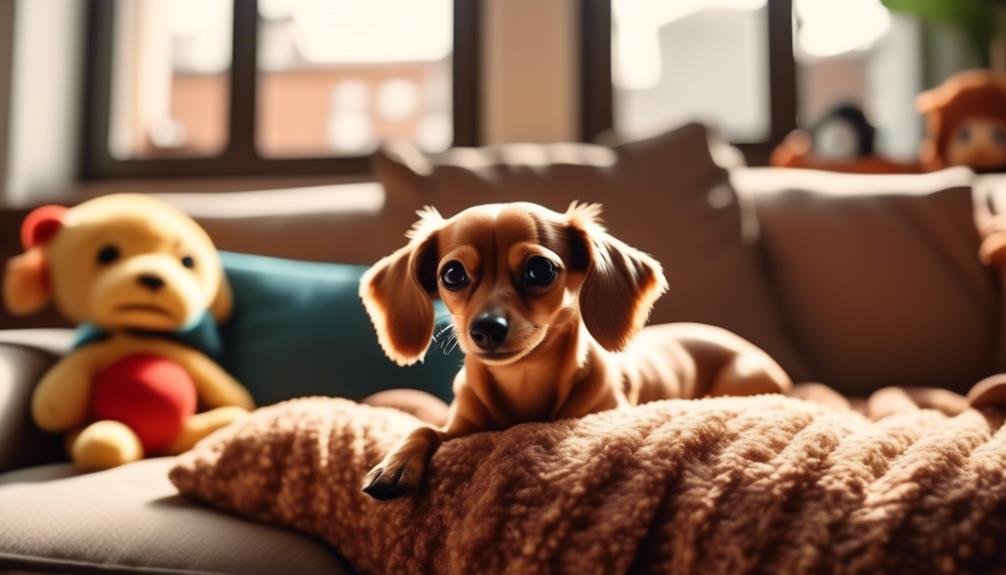
To create a harmonious living environment for everyone involved, it's important to consider the specific needs and characteristics of Chiweenies when it comes to apartment living. Here are three key considerations to keep in mind:
- Size alone shouldn't be the sole determinant for apartment suitability. While Chiweenies are small in size, it's important to also consider their energy levels and behavior towards neighbors. Quiet, low-energy, and polite behavior are desirable qualities for apartment dogs.
- Some small breeds with higher energy levels can still thrive in apartments. It's not just about size, but also about the individual dog's temperament and exercise needs. Assess the energy levels of the Chiweenie and ensure that you can provide enough exercise and mental stimulation to keep them happy and content in an apartment setting.
- Some larger breeds can adapt well to apartment living. While Chiweenies are small, there are larger breeds that can also do well in apartments. Consider the energy levels and exercise requirements of these breeds, as well as their behavior towards neighbors, to ensure a good fit for apartment living.
Factors Beyond Size for Apartment Suitability

Consider more than just the size of a dog when determining their suitability for apartment living. While size is an important factor, there are other considerations that can impact a dog's ability to thrive in an apartment environment.
Energy levels play a crucial role, as high-energy dogs may struggle in a small space without sufficient exercise and mental stimulation.
Additionally, behavior towards neighbors is important. Polite and quiet behavior is desirable, as excessive barking or aggression can disrupt the peace and harmony of apartment living.
It's also important to consider your own experience as a dog owner. Some breeds may be better suited for experienced owners, while others may be more suitable for first-time owners.
Behavioral Considerations: Aggression and Fear

Aggression in dogs is often rooted in fear and anxiety. It's important to understand the behavioral considerations surrounding aggression and fear in Chiweenies to ensure their well-being. Here are three key points to consider:
- Fear-based aggression: Chiweenies may exhibit aggression when they feel threatened or scared. This can lead to bites or attacks if not properly addressed. It's crucial to identify the triggers and work on desensitization and counter-conditioning techniques to help them overcome their fears.
- Socialization: Early socialization plays a significant role in a Chiweenie's behavior towards other animals and people. Properly introducing them to different environments, animals, and experiences can help reduce fear and aggression.
- Training and positive reinforcement: Positive reinforcement training techniques can be highly effective in addressing aggression and fear-related behaviors. Reward-based training methods help Chiweenies build confidence and trust, reducing anxiety and aggression.
Vocalization Tendencies
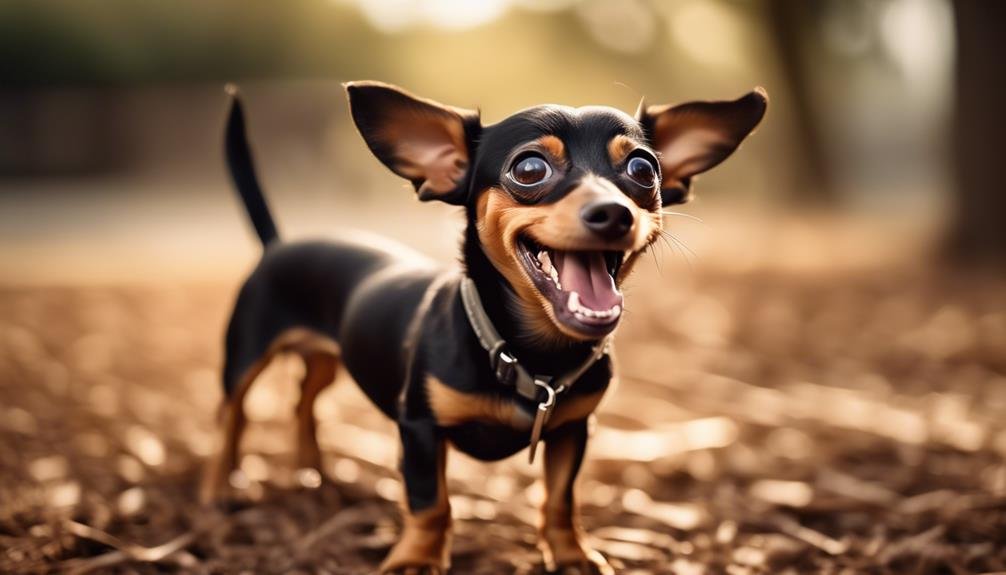
Chiweenies, like many other dog breeds, have varying tendencies when it comes to vocalization. Some Chiweenies are known to be quite vocal, while others may be more reserved in their vocalizations. Here is a table highlighting the different vocalization tendencies you may observe in Chiweenies:
| Vocalization Tendency | Description |
|---|---|
| High | These Chiweenies tend to bark or howl frequently and may be more prone to vocalize their emotions. |
| Moderate | These Chiweenies may vocalize occasionally, but not excessively. They may bark or whine when necessary. |
| Low | These Chiweenies are generally quiet and may not vocalize much. They are more reserved in their vocalizations. |
It's important to note that individual Chiweenies may have their own unique vocalization tendencies, influenced by factors such as their upbringing, environment, and personality. Understanding and addressing your Chiweenie's vocalization tendencies can help create a harmonious living environment for everyone involved.
Wanderlust Potential

After understanding the vocalization tendencies of Chiweenies, it's important to explore their inclination towards wanderlust. Chiweenies have a moderate wanderlust potential, which means they may have a tendency to wander off if given the opportunity. Here are three key factors to consider:
- Breeding background: Chiweenies are a mix of Chihuahua and Dachshund breeds. Both of these parent breeds have a moderate wanderlust potential, with Dachshunds being known for their scent-following instincts. This genetic background can contribute to the wanderlust potential in Chiweenies.
- Size and energy levels: Chiweenies are small dogs with moderate energy levels. While they may not require as much exercise as larger breeds, they still have a need for mental and physical stimulation. If their exercise needs aren't met, they may become restless and more likely to wander.
- Training and supervision: Proper training and supervision play a crucial role in managing a Chiweenie's wanderlust potential. Teaching them reliable recall commands and providing a secure and fenced-in environment can help prevent them from wandering off.
Energy Levels and Exercise Requirements
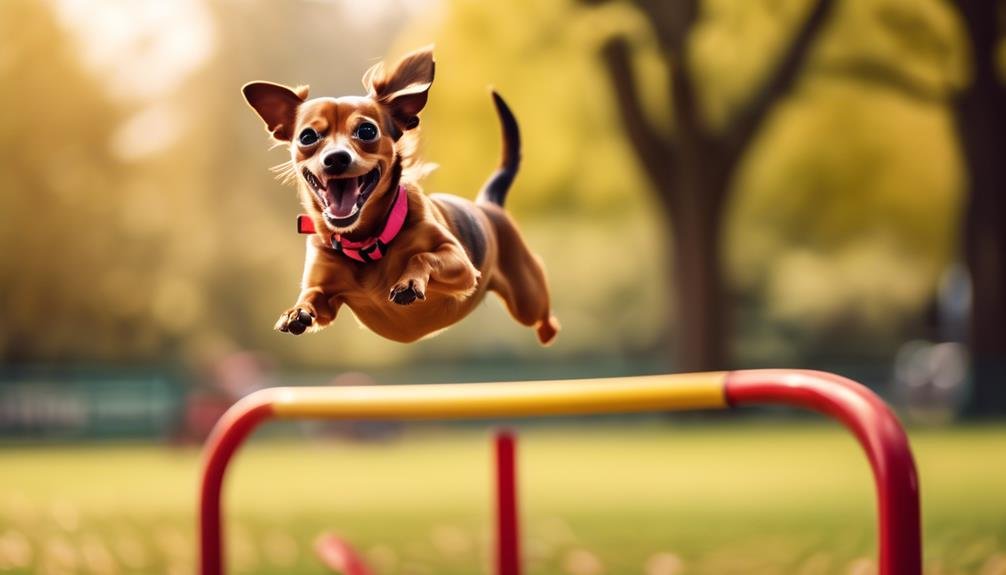
Chiweenies have varying energy levels and exercise requirements that should be considered when choosing this breed. Understanding their energy levels can help ensure that you provide them with the appropriate amount of physical activity and mental stimulation. Below is a table outlining the different energy levels and exercise requirements of Chiweenies:
| Energy Level | Exercise Requirement |
|---|---|
| High | Daily walks, playtime, and mental stimulation |
| Medium | Regular exercise, such as walks and interactive play |
| Low | Short walks and gentle play |
It is important to match their energy level with your own activity level to ensure a harmonious lifestyle. High-energy Chiweenies will benefit from activities like agility, while low-energy Chiweenies are better suited for a calmer lifestyle. By understanding their energy levels and exercise requirements, you can provide your Chiweenie with the appropriate amount of physical and mental stimulation to keep them happy and healthy.
Playfulness Levels
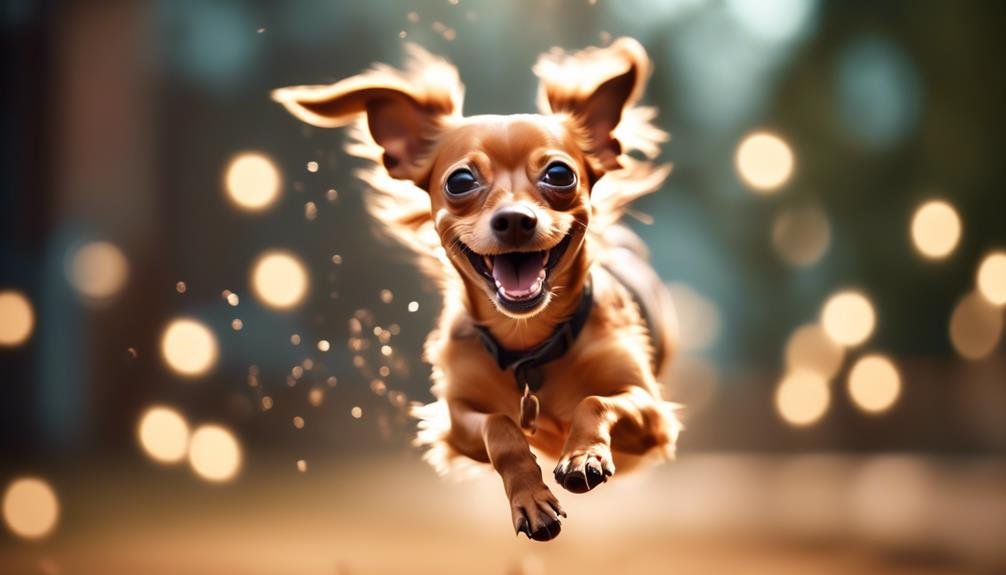
Playfulness levels in Chiweenies vary, and understanding their level of playfulness is essential when considering this breed. Here are three important points to know about Chiweenie playfulness:
- Moderate Playfulness: Chiweenies generally have a moderate level of playfulness. They enjoy interactive playtime with their owners and are always up for a game of fetch or tug-of-war. However, they also appreciate quiet downtime and can relax on their own.
- Social Interaction: Chiweenies are social creatures and love to play with their human family members. They thrive on attention and interaction, so be prepared to spend quality time engaging in play with them. They also get along well with other dogs and can enjoy playdates at the park.
- Mental Stimulation: Chiweenies are intelligent dogs that benefit from mental stimulation through play. Puzzle toys, treat-dispensing toys, and interactive games can help keep them mentally sharp and prevent boredom. Engaging their minds during playtime will help satisfy their need for mental stimulation and keep them happy and content.
Health Issues and Care

To properly care for your Chiweenie and address potential health issues, it's important to understand their specific needs and be proactive in their care. Chiweenies can be predisposed to health issues that are shared with their Chihuahua and Dachshund parent breeds. Common health problems include hypoglycemia, diabetes, degenerative disc disease, dental issues, hypothyroidism, knee and joint issues, and allergies. Regular veterinary checkups are essential for early detection of health concerns.
It's crucial to establish a daily exercise routine to manage weight gain and their high energy levels. Additionally, regular ear cleaning and nail trimming are important for their overall well-being. Focus on maintaining oral health through daily teeth brushing and seek guidance from your veterinarian for a proper care routine.
Formulate a diet specifically designed for small breeds with high energy levels, sticking to a regular feeding schedule and limiting treats to prevent weight gain. Consult your veterinarian for specific dietary recommendations based on your individual dog's needs, as their dietary needs change from puppyhood to adulthood and into their senior years. Avoid leaving food out during the day to prevent overeating.
Chiweenies have coats that are a mix of their Dachshund and Chihuahua parents' coats and colors, with main colors being brown, black, and white with variations in coat patterns. Short coats are easy to groom with weekly brushing, while longer-coated Chiweenies may require more grooming but may not be allergy-friendly. Consider weather conditions and provide appropriate protection.
Keep in mind that Chiweenies can be easily injured by overly excited children, so they prefer interaction with adults or older kids who play gently. It's important to introduce Chiweenies to other pets slowly and calmly for better compatibility. Early socialization helps Chiweenies get along with other animals, although some Chiweenies may prefer to be the only pet in the household. Training, socialization, and individual temperament also play a role in compatibility with other dogs and cats.
Grooming and Coat Care
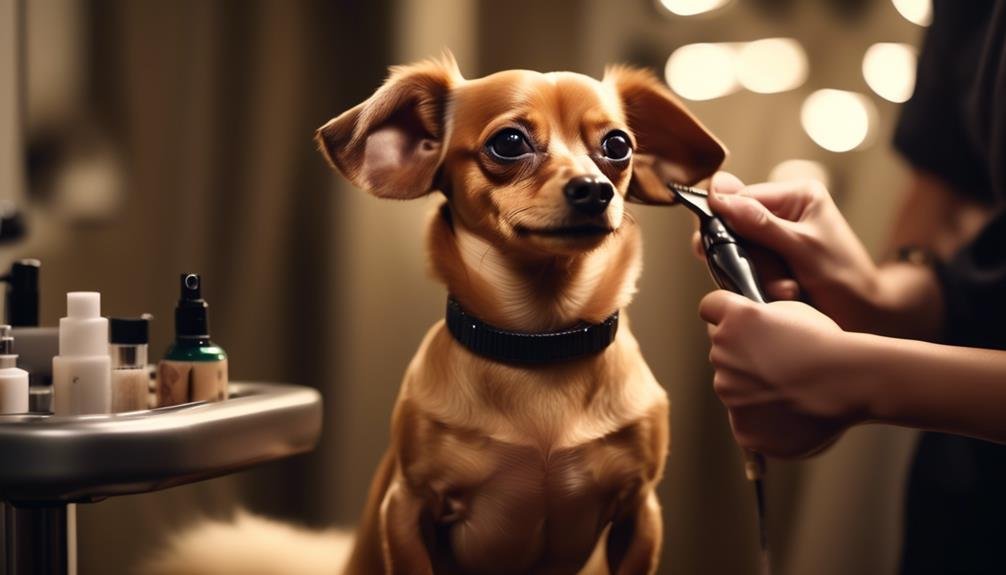
Maintaining the grooming and coat care of your Chiweenie is essential for their overall well-being and appearance. Here are three important tips to keep in mind:
- Regular brushing: Chiweenies have different coat types, including smooth, wiry, or longhaired. Regardless of the coat type, regular brushing is necessary to remove loose hair, prevent matting, and distribute natural oils. Use a soft brush or a comb suitable for your Chiweenie's coat to keep it looking neat and healthy.
- Bathing: Chiweenies typically have a low odor and don't require frequent baths. However, occasional bathing is necessary to keep their coat clean and free from dirt and allergens. Use a mild dog shampoo and make sure to rinse thoroughly to avoid any residue on their skin.
- Nail trimming and ear cleaning: Regular nail trimming is important to prevent discomfort and avoid overgrowth. Additionally, Chiweenies can be prone to ear infections, so it's crucial to clean their ears regularly with a vet-approved solution and gently remove any wax or debris.
Interaction With Children and Other Pets
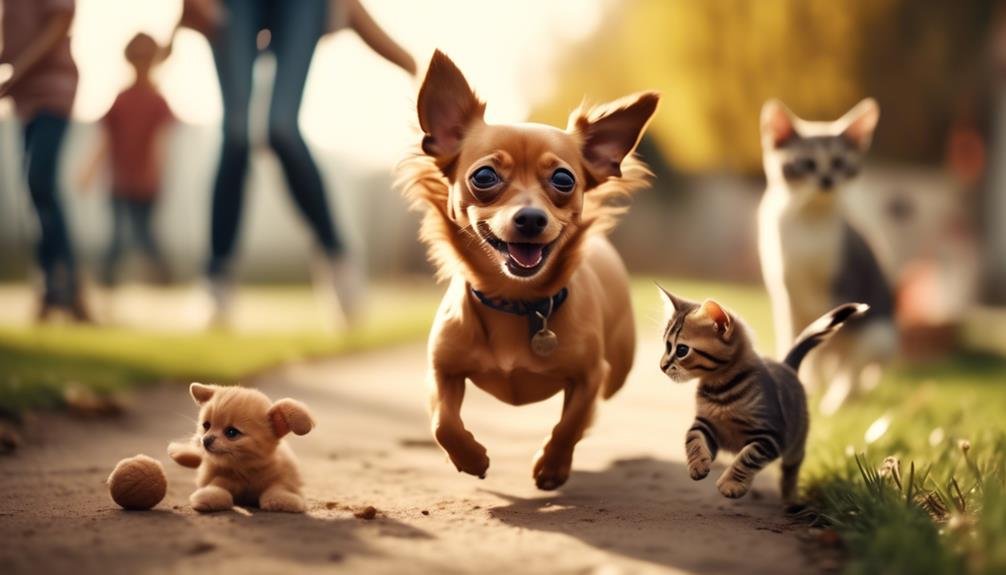
When interacting with children and other pets, it's important to introduce Chiweenies slowly and calmly to ensure better compatibility. Chiweenies can be easily injured by overly excited children, so it's preferable for them to interact with adults or older kids who play gently.
Early socialization plays a crucial role in helping Chiweenies get along with other animals. It's recommended to introduce them to other pets gradually, allowing them to become familiar with each other's scents and behaviors.
Some Chiweenies may prefer to be the only pet in the household, while others can coexist peacefully with other dogs and cats. Training, socialization, and individual temperament also play a significant role in determining compatibility with other pets.
It's important to prioritize the safety and well-being of both the Chiweenie and the other pets during interactions.
Compatibility With Other Dogs and Cats
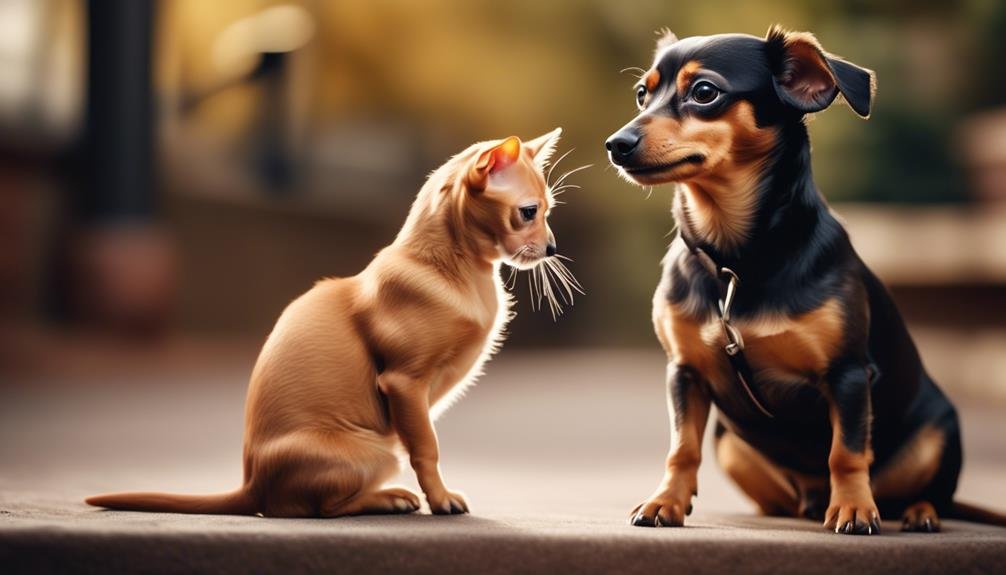
How do Chiweenies interact with other dogs and cats?
Chiweenies can have varied interactions with other dogs and cats depending on their individual temperament, training, and socialization. Here are three factors to consider when it comes to their compatibility:
- Early socialization: Chiweenies who are properly socialized from a young age tend to have better interactions with other dogs and cats. Early exposure to different animals helps them develop positive behaviors and reduces the likelihood of aggression or fear-based reactions.
- Training and individual temperament: Chiweenies that have undergone training and have a calm and friendly temperament are more likely to get along well with other dogs and cats. Training can help them learn appropriate behaviors and better communicate with their furry companions.
- Introduction and supervision: Introducing Chiweenies to other dogs and cats should be done slowly and calmly. Supervision is important to ensure the safety of all animals involved. It's important to monitor their interactions and provide guidance when necessary.
Frequently Asked Questions
Are Chiweenies Hypoallergenic?
No, chiweenies are not hypoallergenic. They have a mix of Dachshund and Chihuahua coats, which can cause allergies. Regular grooming and cleaning can help minimize allergens, but they are not a suitable breed for those with severe allergies.
Can Chiweenies Be Left Alone for Long Periods of Time?
No, chiweenies cannot be left alone for long periods of time. They are social and crave companionship. Leaving them alone for extended periods can lead to separation anxiety and destructive behavior.
Do Chiweenies Require a Lot of Grooming?
No, Chiweenies do not require a lot of grooming. Their short coats are easy to maintain with weekly brushing. However, longer-coated Chiweenies may need more grooming, but they may not be allergy-friendly.
Are Chiweenies Prone to Separation Anxiety?
Yes, Chiweenies can be prone to separation anxiety. They form strong bonds with their owners and may become anxious when left alone for long periods. Proper training and gradual desensitization can help alleviate this issue.
How Well Do Chiweenies Adapt to Different Climates?
Chiweenies adapt well to different climates due to their mixed heritage. They can handle both warm and cold weather, but extreme temperatures should be avoided. Keep them comfortable and protected from harsh conditions for their overall well-being.
What Are the Key Differences Between Chiweenies and German Spitz Dogs?
The key differences between Chiweenies and German Spitz dogs lie in their size, temperament, and appearance. Chiweenies are small, while German Spitz dogs are larger. Chiweenies are known for their affectionate nature, while German Spitz breed characteristics include being lively and alert. Appearance-wise, their coats differ, with Chiweenies having short hair and German Spitz dogs flaunting a thick double coat.
Conclusion
In conclusion, the Chiweenie is a delightful breed that brings joy and companionship to any family. With their small size, playful nature, and affectionate personality, they make wonderful pets for apartment living.
While they may have some health issues to be aware of, proper care and regular vet visits can help ensure a long and happy life.
Overall, the Chiweenie is a charming and loyal companion that will undoubtedly bring love and happiness to your home.




